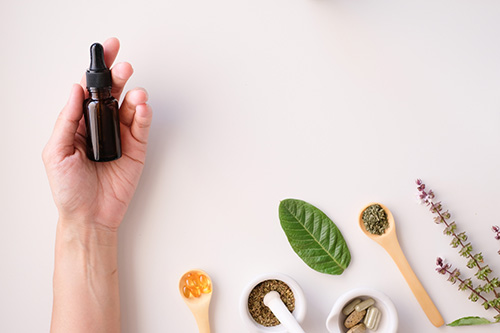Homeopathy, also known as homeopathic medicine, is a time-tested healing modality used successfully around the world. Homeopathy is based on a premise called the Law of Similars: the very same substances that make you sick can be used in minute amounts to heal your body and relieve your symptoms.

If you’ve heard of homeopathy but don’t really know what it is or how it works, you have lots of company. But here in the US, people who use and trust homeopathy, believe it is misunderstood and consider it the right solution for many ailments. And more and more people are discovering its benefits — they like that homeopathic medicine is natural and proven safe with no side effects. But mostly, people rely on homeopathy because it works to help them feel better.
What is homeopathy? How does it work?
Dr. Stills explains homeopathy…
Many of my patients don’t quite “get” homeopathy until I use my favorite example: poison ivy. If you’re allergic to poison ivy and you touch it, you’ll get a nasty itchy rash.
To make a homeopathic remedy for that poison ivy rash — or another rash with the same symptoms — we take the compounds in poison ivy and dilute them many times over until there is no physical poison ivy substance left but just the energetic signature of that plant.
Now we can use that remedy to treat someone with poison ivy or a similar rash.

Homeopathy’s foundation rests on the simple principle that “like cures like.” In practice, homeopathic medicines are heavily diluted substances that cause symptoms in healthy people prescribed to relieve similar symptoms in people who feel sick. Though this sounds counterintuitive, it has a long history of success, especially among patients who feel they have been failed by conventional medicine.
One differentiator between the two schools of thought is that homeopathy uses just enough of a given substance to stimulate the body’s own healing mechanisms — there are no long courses of drug therapies. Patients are is seen as individuals, with their own unique illness experience and the goal is to make them feel so much better that no further medication is needed.
How can homeopathic remedies help?
One of the greatest strengths of homeopathic medicine is that it intends to serve each patient’s very specific needs — nothing more. Though it has its skeptics, homeopathy continues to amaze and impress actual users with its ability to relieve stubborn symptoms, including those that are notoriously uncomfortable.
People who suffer from any of the following symptoms or concerns should consider trying homeopathy to see how it works in their own bodies:
- Hot flashes, cramps, irregular periods, PMS and perimenopausal moodiness. Even though these menopause and hormonal symptoms vary, a generalized homeopathic remedy with a combination of active plant-derived ingredients can provide relief for a diverse set of users.
- Hay fever congestion. Homeopathy has long been used to relieve and prevent the respiratory effects of seasonal allergic rhinitis, better known by its symptoms — sneezing, stuffy nose and itchy eyes.
- Food sensitivity after effects, including indigestion, upset stomach, nausea and gastric discomfort. If you have a true allergy to a specific food, like nuts or shellfish, you should avoid that food completely, as reactions can be extremely serious.
Homeopathy is also a favorite prescription for ear infections, headaches, arthritis, skin problems and pediatric issues. Many practitioners and users believe it can strengthen the immune system. There is some evidence homeopathic remedies may have biologic effects on immune responses though more research is needed to confirm a connection.

How do you use homeopathic remedies?
For many common, everyday symptoms, prepared homeopathic remedies can be remarkably successful at providing relief and helping you feel better. Ready-made remedies come in a variety of strengths that are specified on the label by the number of times each constituent has been diluted. They can be ingested or applied topically, depending on the remedy.
It’s important to follow the directions closely for best results — you may use some remedies multiple times to get the relief you need. In general, a homeopathic remedy is taken as needed, rather than on a set schedule.
For example, unlike most drugs that may require long-term use, some homeopathic remedies are used only for as long as you have symptoms. Hay fever remedies and similar preparations can be different. They’re often used to stimulate a specific response in your body to help desensitize your body to specific irritants by working with your body’s natural detoxification processes.
Is homeopathy right for you?
Many people feel comfortable using both conventional medicines and homeopathy, depending on their symptoms. Knowing your body and understanding how it functions can help you decide whether homeopathy is right for you to try.
If you’re struggling with menopause symptoms that you can’t shake, like hot flashes, night sweats and headaches, a good homeopathic remedy can be effective, safe and easy to use. Many women find lasting relief and are happy to have more control over their symptoms, and their bodies. Now wouldn’t that be nice?
https://www.integrativepractitioner.com/whats-new/news-and-commentary/harvard-study-has-good-news-for-homeopathic-medicine/
Bornhoft, Gudrun, and Matthiessen, Peter F. Homeopathy in Healthcare: Effectiveness, Appropriateness, Safety, Costs. Goslar, Germany: Springer, 2011. https://rd.springer.com/book/10.1007/978-3-642-20638/page/1
Irvine Loudon. J R Soc Med. 2006 Dec; 99(12): 607–610. https://www.ncbi.nlm.nih.gov/pmc/articles/PMC1676328/. Accessed 8.01.15.
https://www.homeopathycenter.org/learn-about-homeopathy
Bordet MF1, Colas A, Marijnen P, Masson J, Trichard M. Treating hot flushes in menopausal women with homeopathic treatment–results of an observational study. Homeopathy. 2008 Jan;97(1):10-5. doi: 10.1016/j.homp.2007.11.005. https://www.ncbi.nlm.nih.gov/pubmed/18194760. Accessed 8.02.16.
https://www.britishhomeopathic.org/bha-charity/how-we-can-help/articles/pre-menstrual-syndrome/
Dossett ML, Davis RB, Kaptchuk TJ, Yeh GY. Homeopathy Use by US Adults: Results of a National Survey. Am J Public Health. 2016 Apr;106(4):743-5. doi: 10.2105/AJPH.2015.303025. Epub 2016 Feb 18. https://www.ncbi.nlm.nih.gov/pubmed/26890179. Accessed 8.02.16.
Bellavite P, Ortolani R, Pontarollo F, Piasere V, Benato G, Conforti A. Immunology and Homeopathy. 4. Clinical Studies—Part 2. Evid Based Complement Alternat Med. 2006;Dec 3(4): 397–409. https://www.ncbi.nlm.nih.gov/pmc/articles/PMC1697745/. Accessed 8.02.16.
https://www.uofmhealth.org/health-library/hn-2194000
https://www.homeopathyjournal.net/article/S1475-4916(15)00162-9/abstract
https://www.sciencemag.org/news/2015/04/fda-takes-new-look-homeopathy
https://www.alive.com/health/homeopathy-and-food-allergies/
Freeman L. Mosby’s Complementary & Alternative Medicine. Elsevier Health Sciences, Jun 9, 2008. p.353.https://books.google.com/books?id=HHijBQAAQBAJ&pg=PA353&lpg=PA353&dq=homeopathy+affects+immune+function&source










